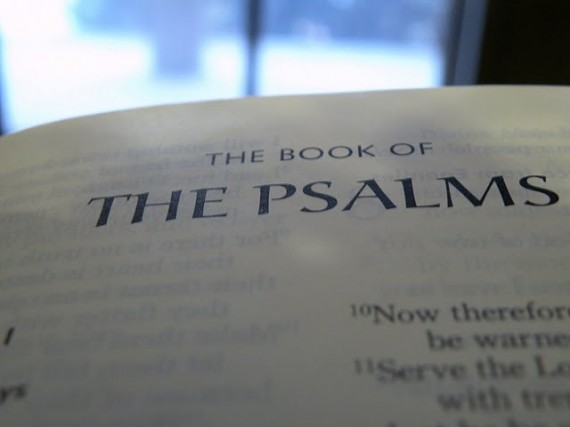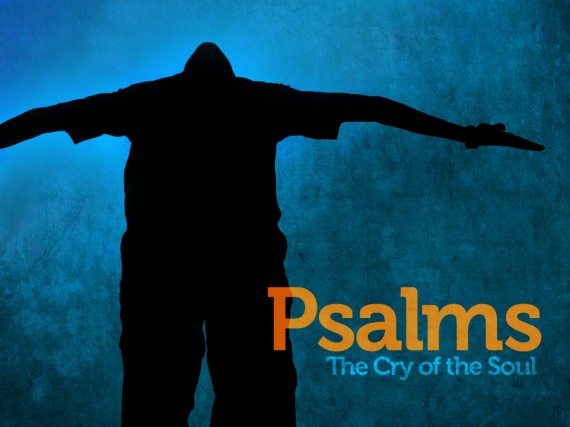In previous posts, we have seen that both the prayers of Jesus and the prayers of Paul were conversational prayers with God. They talked to God about the same sorts of things they would talk to anyone else about, and used the same sort of language. The book of Psalms reflects something similar about prayer. When we pray the Psalms, we learn to pray to God in a way that sounds like we are talking to anyone else.

The Psalms as Prayers
The Psalms are not exactly prayers. They are actually songs that were intended to be sung. But they are not just songs, either. They were intended to be sung when Israel worshiped God in the temple and during their annual festivals. As such, it is safe to think of the Psalms as prayers to God that are sung.
And the great thing about the Psalms is that they reflect the full range of human emotions. If you are feeling something … there’s a Psalm you can use to pray about it.
Most of the Psalms are about giving praise and honor God, and calling on the people to faithfully love and serve Him, but sometimes the Psalmist is angry with God, and tells Him so (Psalms 10:1; 22:1; 42:9; 74:1, 11). Other times the Psalmist is angry and people, and tells God about this too, to the point of asking God to destroy his enemies (Psalms 54:5; 79:10; 143:12). Sometimes the Psalms are quite long (Psalm 119). Sometimes short (Psalm 117). Sometimes they use repetition (Psalm 136). Sometimes they focus on simply praising God (Psalm 150), while others focusing on His past works (Psalm 78).
Walter Brueggemann, in his excellent little book, Praying the Psalms, says that the Psalms are not the voice of God addressing us, but rather contain the voice of a common humanity addressing God (p. 1). When you pray the Psalms, you are praying together with believers throughout the world and throughout time.

Conversations with God
When people wonder what sorts of things they can and should pray about, and what kind of language and words to use when communicating with God, it is often not enough to just tell them that they can have a conversation with God just like with any other person. For some, this seems too informal.
So it is often always a good idea to also recommend the Book of Psalms a helpful guide to learning how to pray and what to pray for. As people pray through the Psalms, they learn that pretty much anything can be said to God, and any emotion is welcome by Him. There are no taboo topics or emotions.
Again, from Walter Brueggemann: “The Psalter knows that life is dislocated. No cover-up is necessary” (Praying the Psalms, p. 9).
But this is just like our real relationships in life, right? Your genuine relationships, your meaningful friendships, are the ones where you interact with each other with honesty and reality. You share your emotions, feelings, and ideas without fear of being judged. Where you do not have this freedom to be real, you do not have a real friendship.
So why do we so often hold back in our prayers? We should not and we must not, if we desire true friendship with God. When we pray the Psalms, we learn to express all our feelings and emotions to God, just as we do with any true friend.
But this is just like life, isn’t it? Our conversations with others cover the whole spectrum of emotions and subjects. Sometimes we are careful with our words and ideas. Other times we don’t hold back.
Just like the prayers of Jesus and the prayers of Paul, praying the Psalms helps us see that prayer is an ongoing and open conversation with God.
All of this, I think, helps us understand what Paul meant when He instructed the Thessalonian believers to “Pray without ceasing.”.
Do you want to pray like never before?
Do you what to talk to God like you talk to a friend? Do you want to see more answers to prayer?
If you have these (and other) questions about prayer, let me send you some teaching and instruction about prayer to your email inbox. You will receive one or two per week, absolutely free. Fill out the form below to get started.

Thanks for visiting this page ... but this page is for Discipleship Group members.
If you are already part of a Faith, Hope, or Love Discipleship Group,
Login here.
If you are part of the free "Grace" Discipleship group, you will need to
Upgrade your Membership to one of the paid groups.
If you are not part of any group, you may learn about the various groups and their benefits here:
Join Us Today.





Love it! Praying the Psalms is one of the cornerstones of a rich conversational relationship with the living God. The New Testament takes it a couple of steps further giving us a commandvitation (a word I coined to try to communicate that all God’s commands are invitations to life for those who are thirsty) to speak the Psalms to one another and sing them in our hearts to the Lord… and sing them when we are joyful (Eph 5:19, Col 3:16 and James 5:13). I would say that the Psalms are exactly prayers, and the Psalms often refer to themselves that way (Psalm 17:1, 39:12, 55:1, etc.), they are just prayers that were written well and meant to be sung. Of course, they are harder to recognize as prayers because they are nothing like what often passes for prayer in churches and prayer meetings today (per your previous posts).
One of the best side-benefits of singing the Psalms is that you end up memorizing them which provides plenty of grist for praying without ceasing!
Commandvitation…. I like it!
They definitely do not fit the prayers we pray in churches! Are you with Tim Nichols on this? He has written some about singing the Psalms…
The more my relationship grows with Him, I often find myself praying/singing new psalms – straight from my heart. I have also found that often, when I journal (writing ti myself), I will begin writing prayers to Him there…and what comes out of that is often amazing – as I journal His response…
That is wonderful! I used to do that a lot, but have not done it for years, and I miss it. I still have my notebooks though.
Praying the Psalms
love this!
The longer I live I see that the people of Scripture were just like us, human to the core. Spirituality is not having it all together, but progressing in God.
The Psalms remind me of Michael Yaconelli’s book MESSY SPIRITUALITY.
When will the church at large begin to understand that this God life is a constant cycle of TROUBLE, TRUST, and TRIUMPH? (This is especially seen in the SONGS OF ASCENT. We will never have it all together in this life? But, let us press on! We will fail greatly at times. But, God is with us! And, thank God that we SOAR at times!